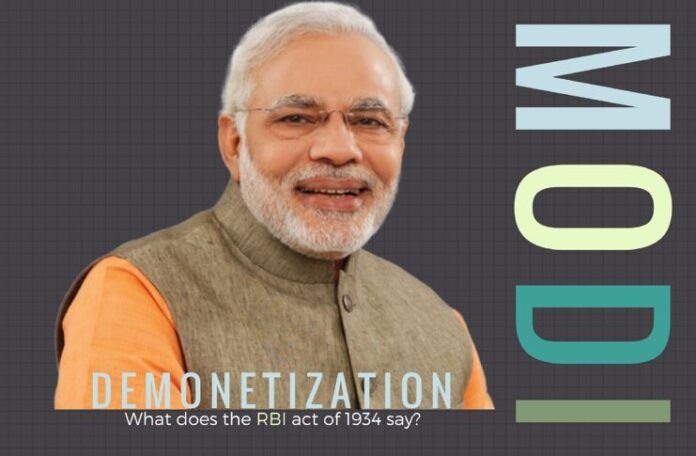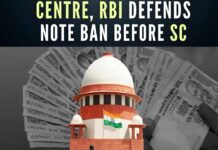
[dropcap color=”#008040″ boxed=”yes” boxed_radius=”8px” class=”” id=””]T[/dropcap]he Congress Party and some others are questioning the legality of the Demonetization Scheme of the Modi Government. And that subject is even going to be looked into on December 2 by the Supreme Court, under the CJI, Thirath Singh Thakur who now seems to have become an arch adversary to the Modi government because of the latter’s alleged delay in the appointment of judges recommended by the Collegium of Judges.
Hence, it it’s crucial to see what the Reserve Bank of India ACT, 1934, says on the subject. Below are the relevant portions of the RBI Act, 1934 regarding issue of notes , their denomination and their legal tender status. Of crucial importance to the subject on hand is Section 26, highlighted in red for the reader’s benefit.
22.Right to issue bank notes.
(1) The Bank shall have the sole right to issue bank notes in India], and may, for a period which shall be fixed by the Central Government on the recommendation of the Central Board, issue currency notes of the Government of India supplied to it by the Central Government, and the provisions of this Act applicable to bank notes shall, unless a contrary intention appears, apply to all currency notes of the Government of India issued either by the Central Government] or by the Bank in like manner as if such currency notes were bank notes, and references in this Act to bank notes shall be construed accordingly.
(2) On and from the date on which this Chapter comes into force the 5[Central Government] shall not issue any currency notes.
23. Issue Department.
(1)The issue of banknotes shall be conducted by the Bank in an Issue Department which shall be separated and kept wholly distinct from the Banking Department, and the assets of the Issue Department shall not be subject to any liability other than the liabilities of the Issue Department as hereinafter defined in section 34.
(2)The Issue Department shall not issue bank notes to the Banking Department or to any other person except in exchange for other bank notes or for such coin, bullion or securities as are permitted by this Act to form part of the Reserve.
24. Denominations of notes.
(1) Subject to the provisions of sub-section (2), bank notes shall be of the denominational values of two rupees, five rupees, ten rupees, twenty rupees, fifty rupees, one hundred rupees, five hundred rupees, one thousand rupees, five thousand rupees and ten thousand rupees or of such other denominational values, not exceeding ten thousand rupees, as the Central Government may, on the recommendation of the Central Board, specify in this behalf.
(2) The Central Government may, on the recommendation of the Central Board, direct the non-issue or the discontinuance of issue of bank notes of such denominational values as it may specify in this behalf.]
25. Form of bank notes.
The design, form and material of bank notes shall be such as may be approved by the Central Government after consideration of the recommendations made by Central Board.
26. Legal tender character of notes.
(1) Subject to the provisions of sub-section (2), every bank note shall be legal tender at any place in India in payment or on account for the amount expressed therein, and shall be guaranteed by the Central Government.
(2) On recommendation of the Central Board the Central Government may, by notification in the Gazette of India, declare that, with effect from such date as may be specified in the notification, any series of bank notes of any denomination shall cease to be legal tender save at such office or agency of the Bank and to such extent as may be specified in the notification.
In the light of the wide powers under Section 26(2) above, it’s a tragic commentary on our media – be it the mainstream print or visual and the social media (which likes to go viral at the drop of a scam) did not bother to educate its audiences with the above basic information which could have silenced all doubting Thomases from Congressman Anand Sharma to Milord Thirath Singh Thakur.
Note:
1. Text in Blue points to additional data on the topic.
2. The views expressed here are those of the author and do not necessarily represent or reflect the views of PGurus.
- To Editors’ Guild; May we also have our say… please? - July 17, 2019
- Farooq Sahab is either down with dementia or he is a congenital liar? - July 8, 2019
- Shah Bano, Muslims in gutter &Zakaria’s secularism - June 30, 2019











Good article in bad times. Anyway Sir can you please help me to understand what is meant by Central Board in 26(2) and what was the recommendations made by Central Board, if any.
Why Narendra Modi’s Demonetization measure violates the RBI Act and creates financial anarchy http://seemasapra.blogspot.in/2016/11/why-narendra-modis-demonetization-law.html
Why is Supreme Court not helping to finish black money?
Unconfirmed reports indicate the many high value legal cases are settled by SC Justices and lawyers when they attend foreign conferences, i.e when they out of the gaze of desi media.
Of course the S C will love to intervene(fere), given half a chance as it is constantly miffed at the central Government for not obeying its diktats and also asking it for introspection/rethink.It is best for the Govt to turn a blind eye and deaf ear to its overtures and proceed further in its fight against black money.
The demonitization is criticized NOT on any doubt of this legal right of the government or RBI, but of the government’s / RBI seems to be lack of preparation for execution of this move. It is argued that the ‘Cost of Control’ should not be greater than the ‘Risk of not controlling it’. Now, the result might prove that the benefit of implementing this control (i.e. demonitization ) is greater and therefore the court might accept it.
A Court is no one to decide something like-
” Was the risk worth it?”
It the duty,
The moral
and
legal right
of the Government to eliminate corruption and black money.
Why do you doubt that?
It did. The RBI Board met at 6 PM followed by a Cabinet meet at 7 PM. Thereafter Hon PM met Hon President and then came the address to the nation.
HariH OM!
A lindring doubt – Did the govt obtain sanction from the Central Board prior to announcing dsemonetization? Is it a statutory requirement to get the sanction first?
Thanks and regards
kalivaradhan